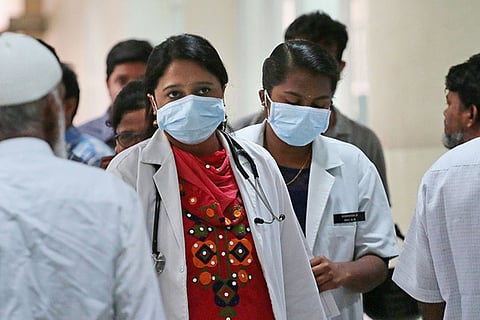

Doctors in Bengaluru have warned patients suffering from diabetes to take extra precautions regarding the current pandemic, given the high mortality rate among diabetics. Doctors said the precautions include maintaining personal hygiene, hydrating oneself all around the day adequately, and monitoring blood glucose and blood pressure levels. Dr Mahesh DM, Consultant, Endocrinology, Aster CMI Hospital, warned that often losing weight despite eating normally could be a sign of high blood glucose and patients should not stop insulin treatment even if they are ill.
Saturday was observed as World Diabetes Day as done on November 14 every year. An analysis of COVID-19 mortalities as of June 11 in Karnataka by the State War Room had found that coronavirus patients suffering from hypertension or/and diabetes mellitus were the worst affected among patients suffering from all comorbidities. 35.11% of all patients who had died and recovered (not accounting for active patients) had succumbed to the infection.
Dr Surekha Shetty, diabetologist at the Karnataka Institute of Endocrinology and Research, said that in Karnataka, diabetes is among the top risk factors when it comes to COVID-19 mortality, with the others being hypertension and kidney disease.
“There is no data to suggest that diabetics are at a higher risk of contracting infection but once they get COVID-19, we have statistics from China and the UK to confirm that their outcomes are poorer (requiring ventilatory support and fatalities) compared to other patients. We do not have any Indian data so far as such,” she said. She added while there is no updated government data on this, the trends which were spotted in June are likely to stay true even till date.
Dr Mahesh said diabetics have a much weaker immune system which makes their bodies more vulnerable to infections and enable the virus. “According to studies, over half of the estimated 77 million diabetes patients in the country do not know that they have diabetes and therefore may not initiate measures to control it. Diabetes impairs the circulatory systems and makes it difficult for blood circulation all-around the body and slows down the pace of recovery from infections like COVID-19,” he said.
He added both diabetes type 1 or 2 are chronic diseases that produce high sugar levels in the blood (or blood glucose). “Elderly patients particularly are more susceptible to the effects of Covid-19 in a diabetes context. Studies have shown a strong link between controlled blood sugar and lower inflammatory markers, while high blood sugar can lead to severe complications or even cause death,” he added.
Dr Mahesh also warned those prescribed medication should not skip medicine as its results may be severe. “Research shows that this may make patients vulnerable to blindness and kidney damage which necessitates dialysis. It can also damage nerves which has serious consequences such as, numbness of the foot can develop when the foot falls asleep due to lack of circulation. This results in patients not knowing or noticing that they have hurt themselves, experienced injury, cut or burn,” he cautioned.
Dr Ravindra M Mehta, Senior Consultant , Pulmonology, Apollo Specialty Hospitals said , diabetes often exists with other comorbidities such as hypertension and heart diseases – each of them adds a certain risk. ‘However, this does not imply that every diabetic will get into trouble. The fact is, if you have diabetes, then there is a 6% chance of getting into trouble because of COVID-19,” he said.
“We have about 40-50% of patients admitted at our hospital, who have diabetes and they seem to be at a higher risk. Diabetics also have a metabolic syndrome – they may be obese, have high blood pressure or cholesterol issues. When we give diabetic patients treatment for Covid-19, we have to give them steroids, and that elevates their sugar levels. This takes it to a higher problem because we then have to recommend higher doses of insulin, and the chances of infection will go up. These are the complicating factors of diabetes and Covid-19,” he explained.